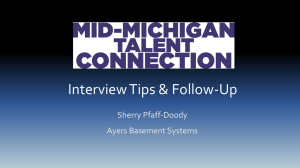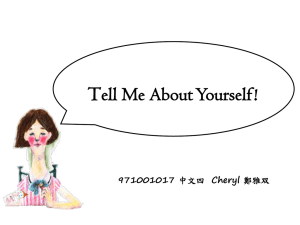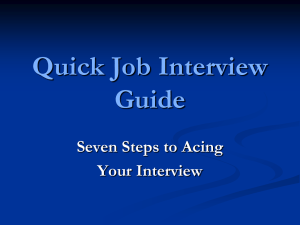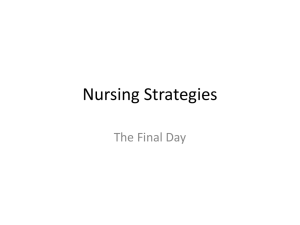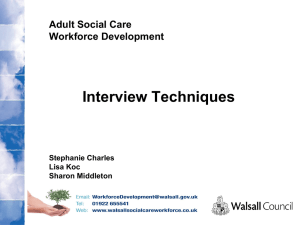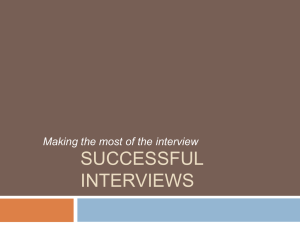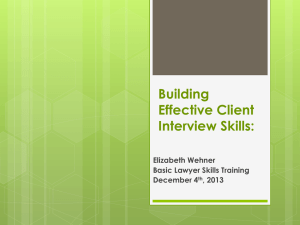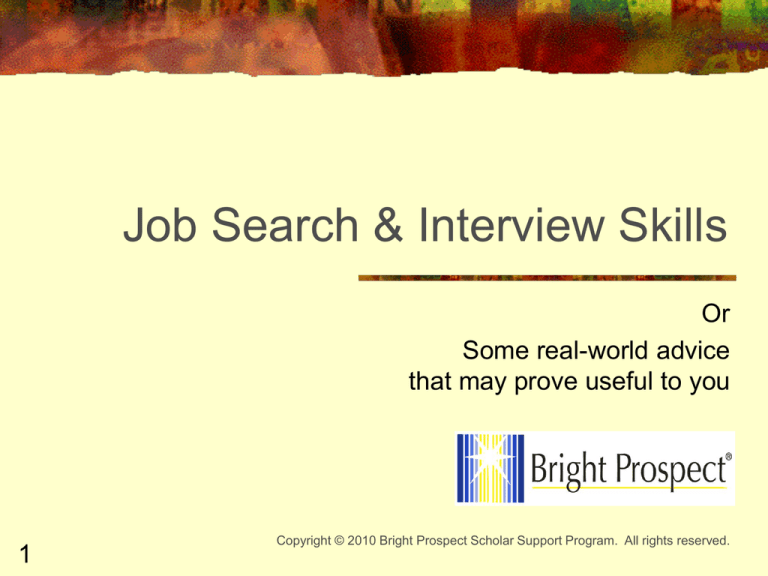
Job Search & Interview Skills
Or
Some real-world advice
that may prove useful to you
1
Copyright © 2010 Bright Prospect Scholar Support Program. All rights reserved.
Job Search & Interview Skills
This presentation is based on personal experience of
conducting hundreds of job interviews, augmented by
ideas taken from the following sources:
2
101 Smart Questions to Ask on Your Interview, 2nd Edition.
By Ron Fry
The Complete Idiot’s Guide to The Perfect Interview, 2nd Edition.
By Marc Dorio
The Everything Job Interview Book – Answer the toughest job
interview questions with confidence.
By Bob Adams
Washington University in St. Louis Career Center presentation
and website materials
Objectives
3
To give you a sense of the job search and
interview process
To help you prepare for your interviews
To provide you with an approach and skills
that lead to a successful outcome
Workshop Outline
Basic Concepts
How to Describe Yourself
General Interview Skills
Take Two Approaches to Your Job Search
4
Searching for Hidden Jobs
Responding to Job Postings
Negotiating the Terms of Your Job
Workshop Outline
Basic Concepts
How to Describe Yourself
General Interview Skills
Take Two Approaches to Your Job Search
5
Searching for Hidden Jobs
Responding to Job Postings
Negotiating the Terms of Your Job
The Fundamentals
6
Your goal in the interview process is NOT to get the job
Your goal is for both the company AND you to evaluate if
THERE IS A GOOD MATCH between:
You
The position
The company
You must be completely truthful in all communications
You should feel confident in your skills strengths
They Don’t Expect You to be
Experienced!
You should NOT feel apologetic that you have
limited experience… They KNOW you are a
NEW graduate!
They don’t expect you to have much experience!
They’re looking for someone just like you:
7
Bright
Energetic
Enthusiastic
Determined
Interested
The Current Economic Situation
8
Possibilities for the future:
Will not know for three months
One year and then better
Really bad
Many people think we may have hit the bottom!
Doesn’t matter, still hiring
Still looking for top people
So you are going to get a job, and a good one!
Workshop Outline
Basic Concepts
How to Describe Yourself
General Interview Skills
Take Two Approaches to Your Job Search
9
Searching for Hidden Jobs
Responding to Job Postings
Negotiating the Terms of Your Job
How will You Describe Yourself to
Employers?
“I worked at Jefco Fabricators as a fileclerk. My primary
responsibility was for checking and filing all the job orders.
or…
“I worked at Jefco Fabricators as a fileclerk. My primary
responsibility was for checking and filing all the job orders.
That meant I had to be highly organized because I typically
had to handle over 500 documents a day. I also took a lot of
initiative in order to organize that function better. When I got
there, documents frequently were getting misfiled, so I
proposed to my boss that I reorganize the files. My boss was
so pleased with the results that she asked me to also
handle…”
10
Illustrating Your Strengths With
Examples From Your Experience
“I worked at Jefco Fabricators as a fileclerk. My primary
responsibility was for checking and filing all the job orders. That
meant I had to be highly organized because I typically had to handle
over 500 documents a day. I also took a lot of initiative in order to
organize that function better. When I got there, documents
frequently were getting misfiled, so I proposed to my boss that I
reorganize the files. My boss was so pleased with the results that
she asked me to also handle…
“On the other hand, my library job was pretty easy but I often had to
work late. I just staffed the check out desk, which of course tied me
down. Except for our 2am closing rush, relatively few people came
through, so I was free to use the time to study. It was an ideal job
for me and helped me make & stay on the Dean’s List.”
11
Illustrating Your Strengths (and
Achievements)
The Jefco answer
Points out three of your key strengths & provides a
concrete example of each
12
Willingness to do repetitive Work
Organization
Initiative
Says that your boss liked your work and gave you
more responsibility
The library answer says that you
Are willing to work late
Use your time wisely
Worksheets: Determining Your
Strengths, Abilities & Values
Current Strengths, Abilities and Values
Step 1: Circle all words that describe you
Step 2: Go back and identify your most important 3-6 strengths
Roadmap for Communicating Your Strengths,
With Examples
Step 1: List your 3-6 most important strengths
Step 2: List each job, or major school activity (clubs, research
etc) that you’ve held.
Step 3: For each job or activity
13
Identify the specific strengths that you demonstrated in that job/activity
Identify one or more concrete example of the use of your strength
Identify what you achieved
Now Organize This Information
for Presentations in Two Ways
14
Organized by job/activity
Organized by strength
1. For Each Job/Activity, Write a
Paragraph Illustrating Strengths
15
State your position
Say what you did
Describe the strength(s) it demonstrates
For each strength, provide a concrete
example and/or outcome
2. Now Turn It Around. For Each
Strength, Give a Job Example
Write a sentence about a strength
Now provide the best example from a job
or activity
16
E.g. “I’m highly organized.”
“In my file clerk position at Jeffco, I had to
handle over 500 documents a day. But the
when I got there…”
Condense All This Into
Your Elevator Speech
Summarize your academic background
Your top 3 or 4 strengths, as illustrated by your work &
academic experience
17
College – and it’s ranking (if impressive)
Your academic achievements (Dean’s list, special awards, Cum
Laude, etc)
I’m a self starter. Working for XYZ Company I…
I’m highly organized. At ABC Company I…
I’ve got great analytical skills. At QRW I had to…
And I’m not afraid of hard work. At college I carried 23 units,
held down a 15 hour a week job, and started on our Division III
soccer team.
Workshop Outline
Basic Concepts
How to Describe Yourself
General Interview Skills
Take Two Approaches to Your Job Search
18
Searching for Hidden Jobs
Responding to Job Postings
Negotiating the Terms of Your Job
Some Common Misconceptions
Misconception #1:
Misconception #2:
Employers know what they want in the person they will hire
Misconception #4:
19
If more than one person interviews you, they have planned their
interviews ahead of time to decide who will ask what
Misconception #3:
The people who will interview you are experts at interviewing
Interviewers like to see you squirm
What is the Employer Trying to Figure
Out Through Their Questions?
20
Can you do the job?
Will you do the job?
Will you actually take the job if they offer it
to you?
Will you fit in with the rest of the group?
The questions they actually ask are all just
trying to answer these basic questions
Interview Killers
Show up late for your interview
Cell phones or other interrupting devices
Being negative about anything (past bosses,
jobs, co-workers, the commute, parking…
anything!)
Lying
Bad body Language
Inappropriate grooming
21
Perfume, Make-up
Clothing
General Advice for Interviews
22
Don’t make small talk (even at the beginning) unless the
interviewer leads off this way. In this case, keep it short.
If the interviewer keeps going, then ask a substantive
question to get the interview started.
Match your style to the interviewer’s style
Watch the interviewer’s body language & adjust your
responses accordingly
Be concise and to the point
Talk as if you’re already in the position you’re seeking
(use the first person “we” and “our” rather than the 2nd or
3rd person “you” and “your” or “they” and “them”)
Don’t tell a joke
Give a Brief Overview
of Your College
West Coast interviewers often are not be familiar with Eastern
colleges. It’s important to educate them!
Mr. Jones, I’ve found that most people here on the west coast
aren’t very familiar with “NAME” college, even though it is
ranked # X in the country by US News & World Report
“NAME” is classified as a highly selective liberal arts college.
In fact, according to US News and World Report it is the Nth
most selective liberal arts college in the nation
Over X% of students admitted to “NAME” were in the top 10%
of their high school class
23
More on Talking About Your
College and You
I think that just as important as what I learned from the
great professors I had, was my interaction with these
other great students from all over the world, who also
had been at the top of their high school classes
We all had to work really hard, and the environment
really pushed us to each do our best
In addition to my coursework, I also:
24
Worked N hours per week
Volunteered N hours per week
Played sports N hours per week
What You Must Commit to Memory
Before ANY Interview
(And Which You’ll Especially Need with Inept Interviewers!)
Know what points you want to get across
Plan these points ahead of time, so that you
demonstrate
25
Your Key Strengths
For each job you’ve held, or major school project, or other
activity, identify which one or two of your strengths it required,
and brief examples that illustrate those points
The description of your College
That you are intelligent
A good communicator
A pleasure to work with…
Conveying Non-Verbal
Information: The Greeting
The Handshake
26
Stand tall, head up, shoulders back, step forward
Grip the hand firmly. Not a bone-crusher or wet noodle
Shake with a sense of purpose and sincerity
Shake for an appropriate period
Shake with one hand
Look the person in the eye
Smile
Use the person’s name when greeting them
Conveying Non-Verbal
Information: Body Language
Appropriate intermittent eye contact
Break eye contact at natural points
Relaxed facial and hand muscles
Nervous gestures
27
Constant nodding
Hands or feet
Playing with an object or part of your body
Posture
Do you have crossed or open arms?
Grooming & personal hygiene
Dress for Success - Women
The standard job interviewing attire for women
is a conservative dark navy or gray skirted
wool blend suit. Job experts and employers
seem split on the notion of pants suits, so a
skirted suit is a safer choice. Other
conservative colors - such as beige or brown are also acceptable.
A blazer with blouse and skirt is a possible
second choice to a suit. Skirt length should be
a little below the knee and never shorter than
above the knee -- no miniskirts here.
Avoid wearing a dress. Blouses should be
cotton or silk and should be white, or some
other light color. Long sleeved is better. No
sleeveless blouses! Shoes should be lowheeled. Keep jewelry, if any, simple & elegant.
Make-up should be minimal, with lipstick and
nail polish conservative tones. Pantyhose
should be flawless (no runs) and conservative
in color. You should opt for a briefcase rather
than a purse. Wear little if any perfume.
28
Taken from http://www.quintcareers.com/dress_for_women.html
A book on this is: When Job-Hunting: Dress for Success, by Dr. Randall Hansen.
Dress for Success - Men
The standard job interviewing attire for men is
a conservative dark navy or gray two-piece
business suit (of natural fibers, such as wool, if
possible), a white long-sleeved button-down
dress shirt, a conservative silk tie (that
matches the colors in your suit), and nicely
polished dress shoes.
If you do not own a suit, or the company is a
bit more informal, then you should wear a
conservative sports coat (no plaids or wild
patterns and preferably a dark color), nicely
pressed dress slacks, a white long-sleeved
button-down shirt, a conservative silk tie, and
nicely polished dress shoes. Your belt should
match your shoes.
If you have a beard or mustache, they should
be neatly trimmed. If you have any visible body
parts pierced, remove them. Also, most
experts recommend removing all jewelry,
including earrings (except a wedding ring).
Wear little if any cologne.
29
Taken from http://www.quintcareers.com/dress_for_men.html
A book on this is: When Job-Hunting: Dress for Success, by Dr. Randall Hansen.
Workshop Outline
Basic Concepts
How to Describe Yourself
General Interview Skills
Take Two Approaches to Your Job Search
30
Searching for Hidden Jobs
Responding to Job Postings
Negotiating the Terms of Your Job
The Two-Pronged Approach to
Job Searches
Finding unadvertised or “hidden” jobs
31
By joining the community you want to be in
(Like dating)
Responding to job openings posted on job
sites, in newspapers, journals and other
sources
Workshop Outline
Basic Concepts
How to Describe Yourself
Take Two Approaches to Your Job Search
32
Finding Hidden Jobs
Responding to Job Postings
Interview Skills
Negotiating the Terms of Your Job
Where Are Hidden Jobs?
Small companies and organizations
Employers are lazy…so you can’t rely on just postings.
Need to talk to people in the field
33
Most jobs are not posted
75-80% of jobs are found through networking
You can create a position
You can learn what YOU want to do
You can educate yourself for a field and later interviews
You can ask questions about further education
You can take a job and look for a career
Sources of Contacts
34
Alums from your college
(Alumni Association)
High school alums
Upper class students
Previous employers
Friends of previous
employers
Faculty, deans, coaches,
RAs & administrators
College Career Center
News articles about the
industry
Job fairs, on-campus
presentations
Volunteer opportunities
On-campus interviews
Conferences or
symposiums on topics
Networking events
How to Uncover Hidden Jobs:
The “Informational” Interview
Objective is to learn as much as possible
about the
35
Industry
Company
Type of job
Meet with someone currently filling, or managing, the
position that you want
You are NOT applying for a particular job, though it’s
always possible that the interview will lead to one!
First Step in Getting an
Informational Interview
36
Send a letter – by Snail mail
Not an email
Not a phone call
1st paragraph addresses who you are & what you want.
If you have a personal connection, lead with that
2nd paragraph should highlight what you have to offer
3rd paragraph keeps the ball in your court for follow-up
Getting the Appointment
Call and leave a message
Second call, try to leave a message with secretary
37
Outline and practice the message you will leave
Message includes that you will call again.
Give times so she/he can schedule the meeting.
Research the Company Before
Your Interview
38
Website
Annual Report
Request brochures about their products or
services
If the company has multiple locations,
find out what this particular location does
Have other alumni from your school gone
to work for the company? If so, call them!
During the Meeting
39
Get the Contact Talking
Soft-Sell Yourself
Ask for a Job or Internship
Getting Your Contact to Talk
40
Thank contact
Ask open-ended questions
Guide conversations to other potential employers and
contacts
Typical Questions for an
Informational Interview
41
Tell me more about what your team does.
What jobs are there on your team? What does each
person do?
What attributes are most important for the person doing
these kinds of job?
How does your team fit into the overall company structure?
Are there trade journals I could be reading? Do you have
any old copies lying around that I could have? Are there
any associations I should join?
Soft-Sell Yourself
– by Asking for Advice
Ask for advice on your
42
Resume
Elevator Speech
(maybe) Cover letter
Ask for a Job or Internship
Do you think that someone with my qualifications would
be competitive for a position at Zyzyx?
Does Zyzyx ever hire entry-level people with my
qualifications?
Does Zyzyx ever have interns? I didn’t see anything on
your web page about it. Would someone with my
background be appropriate?
43
Dealing With the Brush-Off
“You are great, but I don’t do the hiring; Sue Smith
does.”
44
Send letter to Sue Smith
“John Jones recommended I contact you about the analyst
position at XYZ company.”
cc: John Jones
“You sound great, but we don’t have any positions open
now.”
“Are there other managers within Zyzyx that you’d
recommend I speak to who might have an opening?”
“Who do you know in other companies that you’d
recommend I speak to”
After the Meeting
Always send a Thank You Note
Always highlight good news (e.g. if you contacted
someone who that person recommended you call)
Follow-up every couple of months with letter and
“updated” resume to maintain a relationship and develop
person as a mentor
45
Workshop Outline
Basic Concepts
How to Describe Yourself
General Interview Skills
Take Two Approaches to Your Job Search
46
Searching for Hidden Jobs
Responding to Job Postings
Negotiating the Terms of Your Job
Typical Steps in Securing a
Posted Job
47
Respond to an advertised position
Research the company
Pre-interview or “Screening” Interview (primarily
larger companies do this)
The real interview
Follow-up interviews
The Job Offer
Negotiations
Accept your new job!
The Pre-Interview
48
The Pre-interview, AKA the
Screening Interview
Often conducted by someone in a company’s Human
Resources (HR) department, or by an outside
recruitment agency
They are trained in interviewing. It will be to the point!
Can’t get you the job
They are trying to narrow down the field to a few
candidates who will be interviewed by the person who
can give you the job
BUT… They may give you valuable information about
49
The company, position, hiring manager
The culture
What they’re looking for in a successful applicant
Find Out the Ground-Rules
50
At the beginning of every interview, ask:
About how much time do we have for this interview?
Do you mind if I take notes?
Would you prefer that I hold my questions until the
time you’ve allocated at the end of the interview, or
should I ask them as we go?
Asking Questions in the
Screening Interview
51
Ask questions – they turn the interview into a
conversation
Your questions demonstrate a lot about you
DON’T ask about things you’ll learn in the Real Interview
or in the job offer
Questions to Ask of a Screener
What is the salary range for this position?
Tell me some of the particular skills or attributes that you want for
this position
What can you tell me about:
The person who will interview me next?
My boss?
Do you have a written description of this position? I want to make
sure I understand my duties and responsibilities and the results you
expect me to achieve.
What’s a key thing about your company you’d like potential new
hires to know? …What else?
What do you like best about this company? Why?
52
What if the Screening Interview is
Conducted Over the Telephone?
Always project a positive image through your voice
Next to the phone, keep:
53
SMILE while you listen and speak! (Really)
You might try walking around while talking to get relaxed.
A copy of your resume
A list of questions you’ve prepared for them
A notepad
Any research material on the company
The Telephone Screen – How to Detect
& Respond to the Gentle Let-Down
Examples of the Gentle Let-Down:
Response:
54
I appreciate you taking the time… this is a very competitive
position and we’ll be talking to a lot of people…
… if we feel there’s a possibility of a good match for this position,
we’ll get back in touch with you at this number.
Mr. Smith, I’m not sure I’ve done a good job communicating the
credentials that make me perfect for this job and my enthusiasm
for it.
I appreciate how hectic your schedule is, but I think we would
both benefit if we could meet in person. Can I schedule a brief
15-minute interview with you later this week?
The Telephone Screen – How to
Respond to the Hard Turn-Down
A typical hard turn-down:
Response:
No. There just isn’t a good match. There’s no need to come in.
Rebuttal:
55
Ms. Smith, I’m surprised to hear you say that. I must have not fully
communicated the credentials that make me perfect for this job and my
enthusiasm for it. I’d like to meet in person for just 15 minutes to make
my qualifications clearer. Which day this week would be best for you?
2nd turn-down
I’ve listened carefully to what you’ve told me today, and I have to be
honest with you – I don’t think we have a good match here. We’re
going to take a pass this time around.
Ms. Smith, I’m sure that when we meet in person, you’ll see things in
me that must not have come across over the phone. Let’s take just a
few minutes to meet in person before making a final decision. When
can I come in?
The Real Interview
56
Your Interview With the Manager Who is
Making the Hiring Decision
The manager’s primary objectives:
To evaluate your skills
To measure your personal chemistry firsthand
To conclude that you will “fit”, i.e.
57
Can you do the job
Will you do the job
Will you take the job
Will you fit in with the rest of the team
Some of the information the interviewer will use to make
a decision comes from your answers to the questions
But the decision is also based, even subconsciously, on
the non-verbal information that you convey
The Interview Begins. Find Out
the Ground-Rules — Politely
58
At the beginning of every interview, ask:
About how much time do we have for this interview?
Do you mind if I take notes?
Would you prefer for me to hold my questions till a
time that you’ve allocated at the end of the interview,
or should I ask them as we go?
Listen Carefully to Gain Insight
and Draw Parallels to You
Listen carefully to the interviewer’s description of the
company, the department, and the position
Think of ways in which your experience and strengths
would be valuable in this environment (make short notes
of these)
When it’s your turn to talk:
Focus on those particular strengths & experiences
Explain them in context of your jobs or activities
Give your short example for each, including what you
achieved
59
Active Listening and Using What
You’ve Learned
As the interviewer describes the position
Example: You determine that the most important attributes you’d
need are
60
He/she may explicitly state the most important attributes of the person
doing the job
The attributes they want may be implicit in his or her description of the
position. You should confirm your understanding. For example:
“Would you say then that the most important attributes I’d need
for this job would be X and Y? Are there others?”
If it’s not really clear, you can ask, “What would you say are the most
important attributes of the person doing this job? Are there others?”
Organization
Initiative
When it’s time for you to talk, begin with the jobs and activities that
highlight your strengths that most closely match these requirements
How to Answer the Interviewer’s
Questions
Make sure you understand the question. If you’re not sure, ask for
clarification. If a question is ambiguous, ask which of your different
interpretations is actually the question
Think for a moment:
Then give a concise answer, followed by the specific example
Finish with a concluding sentence and then STOP.
61
Try to figure out WHY the interviewer asked that question so that your
answer will address the question behind the question
What’s one of your strengths that you can bring out in your answer?
What’s a good concrete example based on your experience?
Do NOT keep talking. It gets annoying when someone has already made
their point and keeps talking more. When you’re done, you’re done, and
there’s no reason to repeat what you’ve already said, even if you say it
differently. So you don’t want to keep talking. Listeners will start to get
impatient, and feel you’re wasting their time by covering the same material
or giving too many details or examples…
Just like you’re feeling right now!!!
When the Interviewer Interrupts Your
Answer with Another Question
You might make a one- or two-word note of where you
were to help you get back!
If the interruption is related to the original question
If the interruption is totally unrelated
62
Answer the new question quickly and concisely
Then refer to the original question and finish your answer…
concisely
Answer the new question quickly and concisely
Then ask the interviewer if he/she would like you to finish
answering the original question, and if so, finish your answer…
concisely
How NOT to Answer the
Interviewer’s Questions
Do NOT launch into “Your Story”
I.e. do NOT walk the interviewer through your resume
Do NOT answer a different question than the one that is
asked
Do NOT take a long time to get to the point – Start with
the point, and then illustrate it
Do NOT throw in any extraneous information
Doesn’t get to the heart of the question
Doesn’t emphasize one of your strengths
63
Preparing for Questions
You’ll Often Be Asked*
The questions in this section are here for you to read through on your own so
they don’t catch you off guard in an interview. But you’ll only get a few of them,
so don’t spend time crafting a detailed answer to each question! Just be
generally prepared for them.
Ability
and Compatibility
Skills and Experience
Job Compatibility
Culture Compatibility
Interpersonal Skills
Problem-Solving Ability
Driving
64
Forces
Enthusiasm
Motivation
Creativity & Leadership Skills
Professionalism
* This section extracted from The Everything Job Interview Book by Bob Adams. Copyright © 2001 F+W Publications.
Skills and Experience
65
What are your key skills?
What sets you apart from other applicants?
What are your strengths?
What are your weaknesses?
How does your experience relate to this particular job?
What skills do you think are most critical to this job?
Job Compatibility
66
What were the most rewarding aspects of your job at ABC company?
What were some of the limitations of that job?
What are you hoping to achieve in your next job?
What would your ideal job be like?
Now that you’ve heard about this job, which aspect interests you
most? Least?
What aspects of the job do you feel most confident about? Least?
What concerns you most about performing this job?
In your last job, how did the realities differ from your initial
expectations?
In What type of work setting do you feel you are the most productive?
Culture Compatibility
67
What would your friends tell me about you?
How would your last employer describe your work habits and work
ethic?
Tell me about your relationship with your past supervisors. With coworkers.
Talk about a work environment you think would be ineffective for
you
What situations excite and motivate you?
Whom did you choose as your professional references, and why?
Tell me something you learned from reading a recent book?
Do you prefer to work alone or in a group?
Tell me about a situation in which you found it difficult to remain
objective
Interpersonal Skills
68
Tell me about an effective manager you’ve had
What type of management style is most effective with you?
Have you managed people? How would you describe your own
management style?
What type of people do you work with most effectively?
Does your current supervisor do anything you really dislike?
What are the steps you take to organize and plan for a major
project?
Tell me about a time when you’ve had to work under pressure
Tell me about a time when you had to defend an idea to your boss
or someone else in an authoritative position
Have you ever become defensive around your boss or peers?
Describe a leader you admire
What personal characteristics add to your overall effectiveness?
Problem-Solving Ability
69
Describe a time you used problem solving to obtain successful
results
How do you usually go about solving a problem?
How do you measure the success of your work?
How do you balance your reliance on facts and data with your
reliance on intuition?
Tell me about a time when a problem arose that you failed to
anticipate
Describe an opportunity in which you felt the risks far outweighed
the rewards
Enthusiasm
70
What led you to apply for a position in this industry?
What attracted you to this job?
What makes you think you’d be good at this job?
How do you stay current?
Where do you see yourself in five years?
Motivation
71
Tell me something about yourself that I wouldn’t know from reading
your resume
What aspect of the company interests you the most? Why?
What other firms are you interviewing with, and for what positions?
Do you think you’re qualified for this position? Are you overqualified?
What would your dream job be like?
What motivates you to do this kind of work?
What salary would you expect for this job?
Why should we hire you?
Creativity and Leadership Skills
72
What color is your brain?
Would you rather be a hammer or a nail?
Would you rather be a big toe or little toe?
If you got on an elevator and everyone was facing back, what would
you do?
What’s the most innovative project you’ve worked on?
Describe how you’ve overcome an obstacle in a creative manner
How resourceful are you?
Give me an example of where you had to persuade others to adopt
your idea
Give me an example of a situation in which you’ve taken the lead
Professionalism
73
Give an example of how you saw a project through, despite
obstacles
Tell me about a time when you showed real determination.
Diligence.
What is the most difficult task you’ve ever been given?
Would your past supervisors describe you as someone who goes
the extra mile?
Are you punctual?
Tell me about a time when you feel you didn’t perform to your full
potential
Do you think of yourself as concept-oriented or task-oriented?
What would your supervisor say about your attention to detail?
What caused stress in your past jobs, and how did you manage it?
How do you prioritize tasks in your work?
It’s Time for Your Questions
74
By choosing your questions wisely, you can demonstrate
your
Level of intelligence
Organization and preparation
Interest in their company and this job
Goal of ensuring that there is a good match
Higher level of thinking than other candidates
Basic Questions That You Might
Want to Ask the Interviewer
75
Please explain how the team is organized and where
this position fits in
Can you give me a more detailed understanding of what
I might be doing?
How would I be able to help achieve the team’s specific
objectives in my first three months?
What is the one thing I could do in my first three months
that would really get your attention? (in a positive way!)
Questions about the Culture That
You Might Ask
76
How would you describe the culture of both the team
and the company?
What do you like best about this company? Why?
What have you liked least?
Directing the Interview When the
Interviewer is Inept
77
Dealing with an Inept Interviewer
Unlike the HR screeners, the hiring manager:
78
May be a great manager, with NO training in how to interview
May not stay on track
May spend all the time doing the talking, and not asking the right
questions to get to know you
And so, the inept interviewer may make the wrong
decision without really getting the facts about you!
You need to help an unskilled interviewer focus on how
your unique skills directly benefit the department by
citing a number of specific examples from your work,
school and life experience
What Mistakes Do Inexperienced
Interviewers Make?
Spend most of the time telling you about the position, the
company, themselves, or their philosophy
Just ask questions that confirm what’s on your resumé
Show up unprepared
79
Haven’t read your resumé and cover letter
Haven’t thought through the requirements of the position
Haven’t listed questions to ask you
Ask illegal questions
Show up “Out of it.” They may be under the influence,
they may accept telephone or other interruptions, they
may actually work on other tasks during the interview
Unless you take control, they won’t learn about YOU!
An Interviewer
Who Talks Too Much
Give him/her a chance to talk for a while, and then find a
way to jump in
Once you’ve got the floor, talk about some aspect of
your experience that relates to what the interviewer is
saying, and which brings up a strength
80
Sit higher, raise a finger, lift your eyebrows, part your lips
Find a slight pause and interrupt
Acknowledge what the person is telling you
Illustrate your point with a specific example
Then continue without a pause into another experience
that illustrates your next strength
An Example of Taking Control
Interviewer: “… (long winded story about the lazy workers in his
department)… slight pause… take advantage and jump in…
You: “Unfortunately, Mr. Smith, that sounds really familiar. It sounds just like
the people I worked with at Jefco Fabricators. They seemed to want to do as
little as possible. So I always just worked really hard, but quietly, to get
everything done on schedule. In fact, I never missed a deadline, and
frequently asked my boss for additional tasks when I finished my own To Do
list ahead of time.
“For example, my primary responsibility was for checking and filing all the job
orders, but some days I could get that done with hours to spare. So, just as
one example, I suggested to my boss that I could use the extra time I had to
build her an Excel spreadsheet that would sort and summarize the job orders
automatically instead of her doing it manually every week. That spreadsheet
saved her a lot of time.”
81
You CONTINUE: “It’s interesting that my job in our college library this year
was entirely different from my job at Jefco. I found that…”
The Interviewer Who Just Confirms
Your Employment History
82
Wrong Answers: “Let’s see. You worked at Jefco last summer? “Yes” As a
file clerk? “That’s right” And that was from June to August? “Uh huh” And
you mostly did filing of course? “Exactly” …
Right Answer: Say yes, and then continue without a pause to provide
additional elaboration that isn’t necessarily on your resume, and/or which
emphasizes your strengths
“Yes, and my job at Jefco was a lot more challenging than it might at first
appear. I was responsible for {…}, and that meant that I had to be highly
organized because I typically had to handle over 500 documents a day. I
also took a lot of initiative in order to organize that function better. When I
got there, the department was kind of disorganized and documents
frequently had gotten lost, so I took it on myself to completely reorganize
the files. My boss was so pleased, she asked me to also handle {…}.
“On the other hand, my library job was pretty easy, I just staffed the check
out desk, which of course tied me down to the desk. Except for our 2am
closing rush, relatively few people came through, so I used the time to
study. It was an ideal job for me during the school year.”
The Interviewer
Who Isn’t Prepared
If it becomes obvious that the interviewer hasn’t read your resume:
If the interviewer hasn’t fully thought through what he or she expects
you to do, or what characteristics the position requires in a
candidate
83
Give the first part of your Elevator Speech – your academics and your
most recent job using it to highlight strengths and reinforcing your
explanation with an example (as in the previous Jefco answer)
Then without pausing ask, “Would you like me to continue with a brief
summary of my other experience?” (The answer is almost sure to be
yes).
In order to do this, you need to have identified for each job how you
used one or two of your strengths, and an example that illustrates those
points.
Ask, “Can you tell me a little about the position? What kind of tasks
would I be assigned, and what kind of skills or strengths would I need?
Then…pick examples from your work, school projects, or other activities
that illustrate those skills and strengths, and start telling about them!
The Interviewer Asks Illegal
Questions
Typical illegal questions:
If you don’t think your answer will hurt you, go ahead and give it
If you think the answer might hurt you
84
Age
Marital Status
Health Status
Religion, race or ethnic background
Children
If you’ve been arrested
(but they CAN ask if you’ve been convicted – of a felony)
Remember that the interviewer is probably asking this question in order
to answer their REAL question, “Is there something personal that will
get in your way and prevent you from doing the job. So answer:
“Mr. Smith, I can assure you that has no effect on my ability to get this
job done. I keep my personal life and professional life separate, and I
take my professional life very seriously. I always give 100% to my job.”
The Interviewer is Distracted
If there are many interruptions
If the interviewer seems bored
Try varying your voice (tone, loudness, pauses, etc)
Start asking them some questions
If the interviewer seems “under the influence”
85
Be patient, assure the interviewer that you’ve allocated ample time.
If they ask you to reschedule, try to accommodate them. If they
don’t, then consider asking them whether they would like to
reschedule. Then try to reschedule for later that day, and then hang
around. It will minimize your commute, and maximize the pressure
on the interviewer to give you a fair shot!
Say something like, “You don’t look like you’re feeling too well.
Would you like me to reschedule this interview for another day.”
Then decide whether or not you really want to work for this person!
Coming to a Close
86
Establish the Next Step
If you feel pretty confident, ask a hard “close” question
The general preference is for candidates to ask
“soft-close” questions
87
“Mr. Smith, if you have any doubts about whether or not I can do
this job well, can we get those out on the table and probe into
them in order to come to resolution one way or the other?”
“I’ve really enjoyed our discussion, and I’m very interested in this
position. Where do we go from here?”
“Are their others here at XYZ you will want me to meet with?
Can we set up those interviews now?”
How to End the Interview
Summarize
The final words (said while you are standing still, smiling,
looking the person in the eye, and finally shaking hands):
88
What you learned about the job –ask for confirmation
That you really are interested in the job
Your key strengths that relate to the job
That you feel you have a good match
Thank you, Mr. Smith.
I’ve really enjoyed meeting you. I like what I’ve learned about
XYZ and about this job. I believe I’ll do very well in it, and I
believe this position will be both interesting and fulfilling.
I look forward to taking the next step toward you hiring me
Thank you.
THEN, STOP TALKING!
After the Interview
89
Your Follow-Up Letter
Immediately when you get home, write your follow-up letter, and
mail it or email it
1st Paragraph – 2-3 sentences
2nd Paragraph
Restate your interest in the company & job
Briefly restate your most relevant skills
Add anything important that you didn’t cover during the interview (e.g.
another really good example)
3rd Paragraph
90
Thank interviewer for his or her time
Mention something that might jog interviewer’s memory of who you are
Final thank you
How much you look forward to hearing from him or her
If you made definite plans to follow up, describe those plans (e.g. “As
we discussed, I’ll look forward to hearing from you next week.”)
Workshop Outline
Basic Concepts
How to Describe Yourself
General Interview Skills
Take Two Approaches to Your Job Search
91
Searching for Hidden Jobs
Responding to Job Postings
Negotiating the Terms of Your Job
The Job Offer
Get the job offer in writing, including
Ask about personnel policies or review their personnel handbook
92
Will you enjoy the job and the company?
Does it lead to a career that interests you?
Will you feel comfortable in this environment?
Be sure you are comfortable with the personnel policies such as work
hours, vacation time, sick leave, dress code, etc.
Do you really want this job
A written job description
Salary and benefits
Are the culture and staff compatible with you?
Is the physical office environment ok?
What about the money?
You Can, and Should, Negotiate
In most cases, you can negotiate the salary, even if
you’re happy with the offer
A study indicated that
Most companies have a salary range for each position
93
Of new college graduates, men are paid more than women (after
normalizing for difference in the distribution of types of jobs)
Men negotiated salary much more frequently than women
The starting salaries of those who negotiated were higher than
those who didn’t, for both women and men
This difference accounted for a large part of the difference
between male and female salaries!
You can often move to the upper end of the range pretty easily
But moving beyond the range creates a big problem for them!
Negotiating Tips
94
As background, find out what other companies pay for comparable positions
Ask what the salary range is for this position in your screening (or real)
interview
Then, when you get the offer, ask for the top of the range
You mustn’t ask for an outrageous salary
If the company stands firm, and some companies will, then ask if you can have
another two days (or some other specific period) to think over their offer. They
may fold before you do, and call you back with a little more!
If they don’t fold, then decide if you’ll take their offer. If so, call them back
and… ask one more time if they can increase the offer somewhat.
If the answer is still no… go ahead and accept the offer! And show some
enthusiasm!
Well Mr. Smith, I really want to work for ABC and I really like this job, so I’m do
want to accept your offer. I hope that over the coming year, as I prove myself
and demonstrate my abilities, that you’ll adjust my salary as you feel is
appropriate. I really look forward to joining you! When would you like me to
start?”
In Summary
95
Your Expectations and Attitude
96
Expect to have to work hard and often on your search
Think creatively, see it as an exciting, long-term
challenge (Think: Amazing Race)
Put forth at least as much effort as you would for all your
classes put together in a semester – this is your REAL
final exam!
Take advantage of your resources
Stay positive (employers will notice!)
In Summary
Figure out what you want in a job
Prepare yourself by
97
Knowing about the company
Memorizing the strengths you demonstrated in each job, with examples
Go into the process with the goal of deciding if you have a good
match, rather than the goal of getting the job
Be professional, honest, open, friendly
Always follow through after each interview with a letter, and
anything else you promise
Don’t be afraid to negotiate
Enjoy the process. It’s a big world out there, and the more you
explore it, the broader and stronger you will become as a person
And remember… you WILL get a job. A GOOD one!


